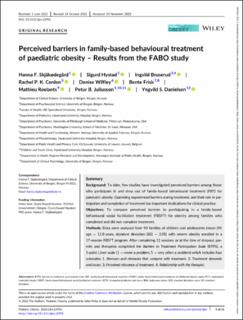| dc.contributor.author | Skjåkødegård, Hanna Flækøy | |
| dc.contributor.author | Hystad, Sigurd William | |
| dc.contributor.author | Bruserud, Ingvild Særvold | |
| dc.contributor.author | Conlon, Rachel P. K. | |
| dc.contributor.author | Wilfley, Denise | |
| dc.contributor.author | Frisk, Bente | |
| dc.contributor.author | Roelants, Mathieu | |
| dc.contributor.author | Juliusson, Pétur Benedikt | |
| dc.contributor.author | Danielsen, Yngvild Sørebø | |
| dc.date.accessioned | 2023-01-30T12:25:51Z | |
| dc.date.available | 2023-01-30T12:25:51Z | |
| dc.date.created | 2022-12-24T11:31:42Z | |
| dc.date.issued | 2023 | |
| dc.identifier.issn | 2047-6302 | |
| dc.identifier.uri | https://hdl.handle.net/11250/3047092 | |
| dc.description.abstract | Background: To date, few studies have investigated perceived barriers among those who participate in and drop out of family-based behavioural treatment (FBT) for paediatric obesity. Examining experienced barriers during treatment, and their role in participation and completion of treatment has important implications for clinical practice.
Objectives: To compare perceived barriers to participating in a family-based behavioural social facilitation treatment (FBSFT) for obesity among families who completed and did not complete treatment.
Methods: Data were analysed from 90 families of children and adolescents (mean (M) age = 12.8 years, standard deviation (SD) = 3.05) with severe obesity enrolled in a 17-session FBSFT program. After completing 12 sessions or at the time of dropout, parents and therapists completed the Barriers to Treatment Participation Scale (BTPS), a 5-point Likert scale (1 = never a problem, 5 = very often a problem) which includes four subscales: 1. Stressors and obstacles that compete with treatment, 2. Treatment demands and issues, 3. Perceived relevance of treatment, 4. Relationship with the therapist.
Results: Families who did not complete treatment scored significantly higher on the BTPS subscales stressors and obstacles that compete with treatment (M = 2.03, SD = 0.53 vs. M = 1.70, SD = 0.42), p = 0.010 and perceived relevance of treatment (M = 2.27, SD = 0.48 vs. M = 1.80, SD = 0.50), p < 0.001 than families who completed treatment. No other significant differences between groups were observed.
Conclusion: Families are more likely to drop out of FBSFT when experiencing a high burden from life stressors or when treatment is not meeting the expectations and perceived needs of the family. | en_US |
| dc.language.iso | eng | en_US |
| dc.publisher | Wiley | en_US |
| dc.rights | Navngivelse 4.0 Internasjonal | * |
| dc.rights.uri | http://creativecommons.org/licenses/by/4.0/deed.no | * |
| dc.title | Perceived barriers in family-based behavioural treatment of paediatric obesity – Results from the FABO study | en_US |
| dc.type | Journal article | en_US |
| dc.type | Peer reviewed | en_US |
| dc.description.version | publishedVersion | en_US |
| dc.rights.holder | Copyright 2022 The Author(s) | en_US |
| dc.source.articlenumber | e12992 | en_US |
| cristin.ispublished | true | |
| cristin.fulltext | original | |
| cristin.qualitycode | 1 | |
| dc.identifier.doi | 10.1111/ijpo.12992 | |
| dc.identifier.cristin | 2097322 | |
| dc.source.journal | Pediatric Obesity | en_US |
| dc.identifier.citation | Pediatric Obesity. 2023, 18 (3), e12992. | en_US |
| dc.source.volume | 18 | |
| dc.source.issue | 3 | |

